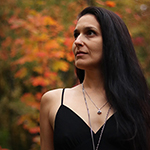 Poetry and Fiction Editorial Board member Délani Valin talks with the Far Horizons Award for Poetry winner about objects as storytellers, themes of death and rebirth, and how the past and present are in constant dialogue in her poem, “Inner Child Work.”
Poetry and Fiction Editorial Board member Délani Valin talks with the Far Horizons Award for Poetry winner about objects as storytellers, themes of death and rebirth, and how the past and present are in constant dialogue in her poem, “Inner Child Work.”
DV: Judge Laura Ritland remarked on the form of the poem, particularly all of the ways in which it “recalls and rewires the sonnet form.” Can you talk about why you chose the form, and how it relates to the poem’s subject matter?
MY: Any one of us on a healing journey will hear, at some point or other, that progress is not linear. There aren’t measured, methodical steps leading us to one final, blessed state. It has peaks and valleys, and winding rivers. As we learn new ways of seeing, being, and feeling, we realize that they don’t always translate seamlessly into our hardened patterns. Healing takes time, patience, and practice. A traditional sonnet is known for its strict structure and intricate rhyming scheme. By deconstructing it and allowing it to shift in form, I echo healing’s fluidity. A variation on the sonnet provides a flexible vessel that is akin to the renewing self, as well as the complex and often tumultuous journey leading to it.
Read the rest of Meryem Yildiz's interview, as well as her poem.
Sarah Yi-Mei Tsiang, issue #220 poetry contributor
 Fiction Editorial Board intern Sarah Lachmansingh talks with the fall issue #220 contributor about being a magpie, pregnancy as a leap of faith, and processing the day's happenings through poetry.
Fiction Editorial Board intern Sarah Lachmansingh talks with the fall issue #220 contributor about being a magpie, pregnancy as a leap of faith, and processing the day's happenings through poetry.
SL: Can you talk about the final images in your three poems, and your experience when writing these endings? How do you typically approach an ending or decide when to end a poem?
ST: For “Integrated Care Hub” I wanted to link the narrator’s life to the life of the unhoused that surround her. In the previous stanza she talks about the dog’s medication, amazon packages, and vegan snacks. In what’s left of the ripped-up shelter she names a pill bottle, shoes, and Oreos. This is a poem about connections, both enduring and broken, and I wanted the ending to circle back and reflect this idea.
In “The air, then” I felt like my baby was being created and born in a time of extreme tumult and danger. It didn’t reflect the sweetness of his beginnings and the carefree way we used to share air (which seems so distant now).
With “The Snake” I had actually reworked the ending several times. I wrote this when we had rented a cottage and spent an afternoon watching a snake trying to eat a catfish. I was hugely pregnant and this snake trying to stuff something unmanageable inside his body really resonated with me. It made me think of how pregnancies are a leap of faith—you have no idea how any of it will turn out and what capacities you have as a parent but you just do it anyway.
Read the rest of Sarah Yi-Mei Tsiang's interview as well as one of her poems.